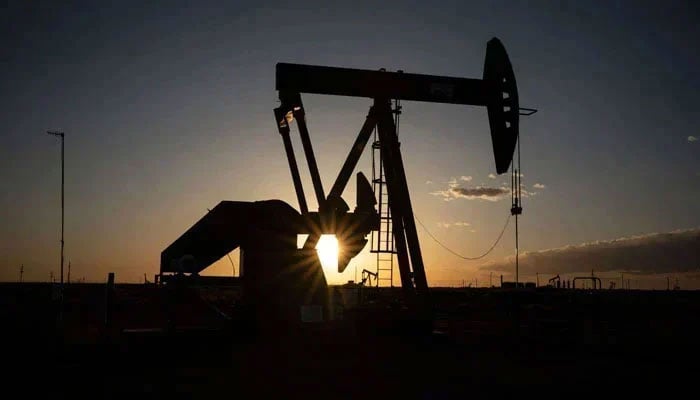Oil rises as US launches Red Sea task force, tankers reroute
LONDON: Oil rose on Tuesday, extending the previous session's gains, after attacks by Yemen's Iran-aligned Houthi militants on ships in the Red Sea disrupted maritime trade and forced companies to reroute vessels.
Brent crude was up 71 cents, or 0.9 percent, to $78.66 a barrel by 1512 GMT. U.S. West Texas Intermediate crude for January , which expires on Tuesday, was up 88 cents at $73.35 while the more active February contract gained 94 cents to $73.75.
Crude on Monday rose nearly 2 percent after a Norwegian-owned vessel was attacked and BP said it had paused all transit through the Red Sea, raising concern over supply disruption. About 12 percent of world shipping traffic passes up the Red Sea and through the Suez Canal.
"Ships are now being re-routed via the Cape of Good Hope, but not only will this add up to 10 days sailing time, it will cost up to $1 million extra in fuel for every round trip between the Far East and North Europe," said Peter Sand, chief analyst at Xeneta.
Though the attacks on shipping have boosted the risk premium, other analysts have noted the incidents said the disruption is not likely to impact supply. "The actual effect on oil flows is likely to be limited," said John Evans of oil broker PVM. "The attacks have not hit anything that would interfere with production," he said.
The United States on Tuesday announced the creation of a task force to safeguard Red Sea commerce from attacks by Iran-backed Yemeni militants, which have disrupted maritime trade and forced companies to reroute vessels.
Denmark's Maersk said on Tuesday its vessels due to sail through the southern Red Sea and the Gulf of Aden would be rerouted around Africa via the Cape of Good Hope due to attacks on vessels in the area. As of Monday, Maersk had paused the voyages of around 20 ships, half of which were waiting east of the Gulf of Aden and the rest south of the Suez canal in the Red Sea or north of it in the Mediterranean Sea, the company said in a statement. A Maersk container ship was targeted but not hit by a missile on Thursday while en route from Salalah, Oman, to Jeddah, Saudi Arabia, and the company on Friday decided to halt all its vessels bound for the Red Sea.
"We are pleased to see ... joint efforts on international maritime security and capacity building in the area to bring forward a solution enabling a return to transit the Red Sea and Gulf of Aden area and the Suez Canal in the near future," Maersk said in a statement.
"Meanwhile, routing vessels via the Cape of Good Hope will ultimately deliver faster and more predictable outcomes for our customers and their supply chains," Maersk added. Future sailings planned through the area would be assessed case by case to determine whether adjustments are necessary, the shipping group said.
Goldman Sachs analysts said the disruption is unlikely to have a large effect on crude and liquefied natural gas (LNG) prices because opportunities to reroute vessels suggest that production should not be directly affected.
Also in focus this week is the latest snapshot of U.S. supplies. U.S. crude inventories are expected to decline by 2.2 million barrels, a Reuters poll showed. The first of the week's two supply reports, from the American Petroleum Institute, is due on Tuesday.
-
 Breezy Johnson Engaged At Olympics After Emotional Finish Line Proposal
Breezy Johnson Engaged At Olympics After Emotional Finish Line Proposal -
 King Charles Wants Andrew To 'draw A Line' Under Epstein Issue
King Charles Wants Andrew To 'draw A Line' Under Epstein Issue -
 John Wick Game Confirmed With Keanu Reeves And Lionsgate Collaboration
John Wick Game Confirmed With Keanu Reeves And Lionsgate Collaboration -
 Gigi Hadid Feels 'humiliated' After Zayn Malik's 'pathetic' Comment: Source
Gigi Hadid Feels 'humiliated' After Zayn Malik's 'pathetic' Comment: Source -
 Olympics Men Hockey Game: McDavid, Crosby Power Canada Past Czechia
Olympics Men Hockey Game: McDavid, Crosby Power Canada Past Czechia -
 Sony PlayStation State Of Play Reveals 'Castlevania' And 'Metal Gear' Return
Sony PlayStation State Of Play Reveals 'Castlevania' And 'Metal Gear' Return -
 Ontario Tuition Freeze Ends, Allowing Colleges And Universities To Raise Fees
Ontario Tuition Freeze Ends, Allowing Colleges And Universities To Raise Fees -
 King Charles Should Apologise To All Rape Victims, Says New Poll
King Charles Should Apologise To All Rape Victims, Says New Poll -
 Cardi B Shares Emotional Message Amid Stefon Diggs Split Rumors
Cardi B Shares Emotional Message Amid Stefon Diggs Split Rumors -
 James Van Der Beek’s 'heartbroken' Ex Wife Breaks Silence Of His Death
James Van Der Beek’s 'heartbroken' Ex Wife Breaks Silence Of His Death -
 Sarah Ferguson, Shamed Andrew Spotted In ‘family Costume Drama’
Sarah Ferguson, Shamed Andrew Spotted In ‘family Costume Drama’ -
 Kylie Kelce Reveals Why She Barely Planned Her Wedding Day?
Kylie Kelce Reveals Why She Barely Planned Her Wedding Day? -
 Why Shamed Andrew Called His Victims ‘Mrs Windsor’
Why Shamed Andrew Called His Victims ‘Mrs Windsor’ -
 Kate Hudson Explains Why Acting Isn't Discussed At Home
Kate Hudson Explains Why Acting Isn't Discussed At Home -
 Prince William, Kate Middleton Epstein Statement Was AI Generated, Says Expert
Prince William, Kate Middleton Epstein Statement Was AI Generated, Says Expert -
 Sarah Ferguson On Her Way To Hurt 'only Two People Who Care About Her'
Sarah Ferguson On Her Way To Hurt 'only Two People Who Care About Her'




